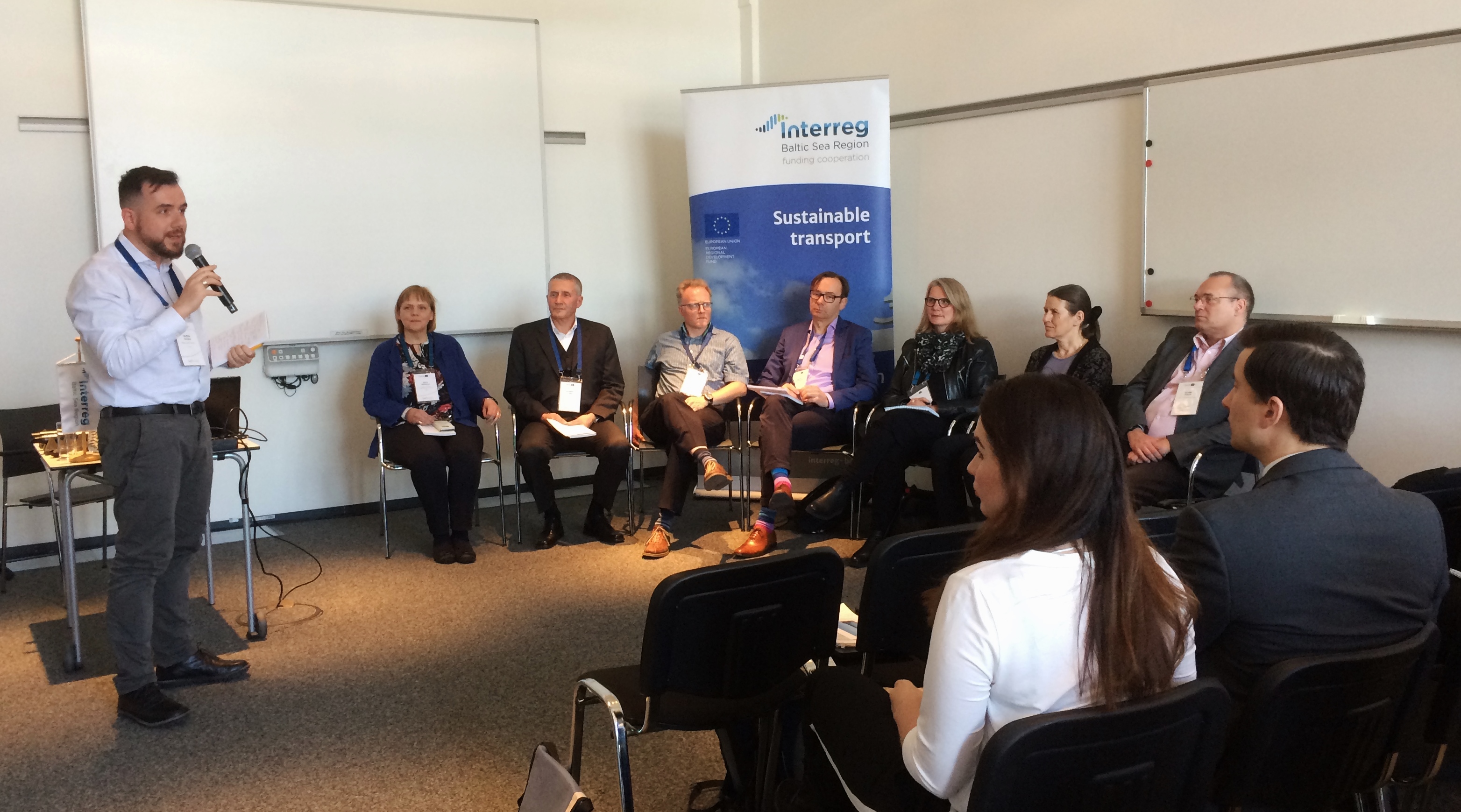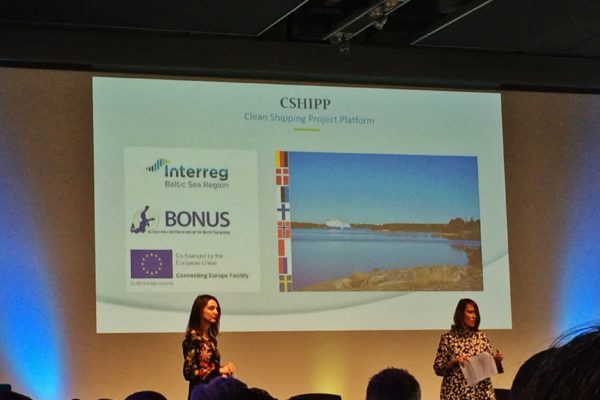The Interreg Baltic Sea Region Programme Conference took place in Lübeck, Germany on the 9-10 April 2019. Projects and partner institutions from around the Baltic Sea Region gathered together to discuss good practices, project results and experiences, and to exchange information about the progress made and plans for the future. Among the conference participants were the Members of the Programme’s Monitoring Committee and their national sub-committees, partners of EU funded projects and platforms, coordinators of the EU Strategy for the Baltic Sea Region, and the Programme’s Managing Authority/Joint Secretariat.
As one of the project platforms benefiting from the Interreg BSR Programme funding and cooperation, Clean Shipping Project Platform (CSHIPP) was actively involved in the conference. The platform organised a clean shipping -themed session which focused on introducing CSHIPP, its objectives and the projects and partners working for sustainable shipping. The session also included an interesting panel discussion focusing on the relationship between clean shipping and business. The session was moderated by Michele Acciaro (Associate Professor, Kühne Logistics University) and the speakers included Niels Gorm Malý Rytter (ECOPRODIGI project, Associate Professor, Aalborg University), Alexander John (BSR Electric project, Consultant, ATI Küste GmbH – Association for Technology and Innovation), Gunnar Prause (EnviSuM project, Professor, Tallinn University of Technology & Wismar University), Jana Moldanova (SHEBA project, Senior Scientist, IVL Swedish Environmental Research Institute), Bogdan Ołdakowski (Secretary General, Baltic Ports Organization), Maarit Lappalainen (Program Manager, Carinafour) and CSHIPP project manager Riitta Pöntynen (University of Turku – Centre for Maritime Studies).

Moderator Michele Acciaro and the panellists getting ready to discuss clean shipping.
The first part of the session introduced the audience to CSHIPP and four of the projects taking part in the platform: SHEBA, EnviSuM, ECOPRODIGI and BSR Electric. Project representatives shed light on the work done in projects and discussed the outcomes as well as the projects’ relevance for sustainable shipping. After the presentations, the audience was treated to a discussion on clean shipping and its relationship with business. Moderator Michele Acciaro introduced the topic by explaining that the developments made in, for example, digitalisation, automation and electric mobility solutions make clean shipping very current and relevant topic for the industry. He noted that shipping is going through exciting times, with all the multiple technologies and regulations pushing the industry to a more sustainable direction. With this in mind, Mr. Acciaro invited the panellists to discuss the ways in which more private sector actors could be involved in project collaborations. Ms. Maarit Lappalainen noted that one of the points is that the reality of businesses needs to be taken into account as companies have to move fast and results are often needed quickly. In this sense, the reality that companies face is somewhat different from that of many research organisations and this may cause challenges in project collaboration if not considered in advance. In addition, to get a clear picture and to understand the various internal processes underlying private sector operations, companies need to be involved in a very direct manner in order to gain concrete benefits. Mr. Bogdan Ołdakowski echoed this view by pointing out that it is crucial to keep in mind that companies are profit-oriented and that projects need to address the actual challenges faced by businesses. For this reason, business representatives need to be involved in discussions and planning from the very beginning.

Audience listening to the panel discussion.
Mr. Acciaro also invited the panellists to share their thoughts about the future of sustainable shipping which he saw as being shaped by multiple different technologies and innovations. Based on the preliminary findings from ECOPRODIGI project, Mr. Niels Rytter noted that companies and the maritime industry in general need to be more data driven to improve their performance and sustainability. He also pointed out that processes such as digitalisation are usually very long journeys which nevertheless needs to be taken if any real benefits are expected. Ms. Lappalainen continued in the same vein by emphasising that proper knowledge about the current state of affairs is needed as a starting point for any improvements in sustainability. How could the public sector support and incentivise private sector it the approaches to sustainability?, inquired Mr. Acciaro. According to Mr. Rytter, more projects focusing on supporting the adoption of technological innovations is needed to speed up the development. On her part, Ms. Jana Moldanova brought up the positive impact regulatory measures can have on private sector behaviour. However, in order to make regulations bearable for companies, Mr. Ołdakowski emphasised the need to involve the private sector and especially smaller businesses into the discussions and planning processes. Without proper consultation, the danger is that regulatory measures and requirements push private sector actors out of the market.
In addition to the clean shipping-themed session organised by CSHIPP, the platform was also represented at the closing session of the conference as Jana Moldanova and Bogdan Ołdakowski took part in the discussion on project platforms relevance for policy and business processes. According to Ms. Moldanova, policy recommendations for sustainable shipping, synthesised knowledge and clear analysis of findings for further utilisation are among the most important expected outcomes of CSHIPP and thet will benefit both business and policy representatives. Mr. Oldakowski pointed out that the results from platforms such as CSHIPP are likely to be of special interest to business associations who will disseminate the information to their members. In order to ensure that the legacy of platforms lives on even after the projects have finished, Ms. Moldanova suggested that it would be beneficial if platform partners had the opportunity to join expert and task groups at various levels to ensure continuation and dissemination of outcomes. Connections to business associations were also seen as important.






